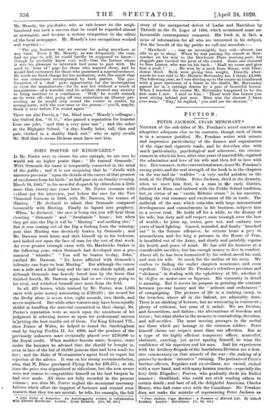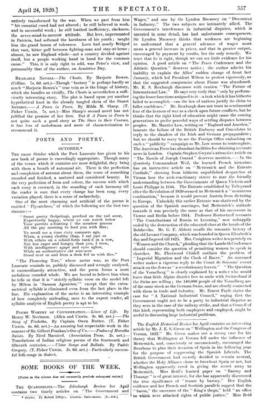FICTION.
altogether adequate clue to its contents, though each of them is in a measure justified. Mr. Frankau writes with minute
and impressive particularity of the finance and organization of the cigar and cigarette trade, and he describes also with much particularity, psychological and otherwise, the circum- stances in which his hero, after nine years of married life, regained the admiration and love of his wife and then fell in love with her. But romance, in the conventional sense, is not Mr. Frankau's strong point, and the real strength of the book is in the chapters on the war and its " realities "—a very useful antidote to the work of Sir Philip Gibbs. Peter Jackson, third in the dynasty, when we meet him first, is a man in the early thirties, educated at Eton, and imbued with the Public School tradition, but, in virtue of an " exotic Hebraic strain " in his ancestry, finding the real romance and excitement of life in trade. The outbreak of the war, which coincides with large international developments and commitments in his business, subjects him to a severe trial. He holds off for a while, to the dismay of his wife, but duty and self-respect soon triumph over the lure of wealth ; he joins up, trains, goes out, and endures two years of hard fighting. Gassed, wounded, and finally knocked out" in the Somme offensive, he returns home a prey to neurasthenia and for long a prisoner in the House of Fear, is invalided out of the Army, and slowly and painfully regains his health and peace of mind. He has sold his business at a considerable sacrifice, but has enough money to live in comfort. Above all, he has been humanized by his ordeal,saved his soul, and won his wife. So much for the outline of the story. We confess to finding the earlier chapters wearisome, and even repellent. They exhibit Mr. Frankau's relentless precision and " slickness" in dealing with the upholstery of life, whether it be chiffon or motor-cars or liqueurs. His virtuosity in detail is amazing. But it serves its purpose in pointing the contrast between pre-war luxury and the " ardours and endurances " of campaigning. The pictures of life in a training camp, in the trenches, above all in the Salient, are admirably done. There is no shirking of horrors, but no wantoning in sentiment ; plenty of criticism, but none of it unfair. We see friction, and favouritism, and failure ; the alternations of boredom and terror ; but what abides in the memory is comradeship, devotion, and self-sacrifice. The most moving passages in the recital are those which pay homage to the common soldier. Peter himself claims our respect more than our affection. But as a type of the highly efficient temporary officer, masterful, obstinate, exacting, yet never sparing himself, he wins the confidence of his superiors and his men. And his experiences with the Artillery Brigade of the Southdown Division are a first- rate commentary on that miracle of the war—the making of a. gunner by modern " intensive" training. The portraits of Peter's brother-officers, Regulars and ex-civilians, are varied, etched with a sure hand, and with many human touches—especially the fiery little Brigadier ; Purves, who gradually sheds his Balliol manner ; Sandiland, who could not stick sending others to certain death ; and best of all, the delightful American, Charles Henry, who had come over with the Canadians. Mr. Frankau does not make the mistake of representing Peter Jackson as • Peter Jackson. Cigar Merchant : a Romance of married life. By Gilbort Erankau. London : IiutchInson. 17s. Gd. net.) entirely transformed by the war. When we part from him " his essential creed had not altered ; he still believed in work, and in successful work ; he still loathed inefficiency, slackness, the never-mind-to-morrow attitude. But love, impersonated in Patricia, had softened the harshness of his youth ; taught him the grand lesson of tolerance. Love had nearly Bridged that vast, bitter gulf between fighting-man and stay-at-home ; almost, he saw England whole—not a country divided against itself, but a people working hand in hand for the common cause." This, it is only right to add, was Peter's view, and presumably that of the author, on Armistice Day.



































 Previous page
Previous page